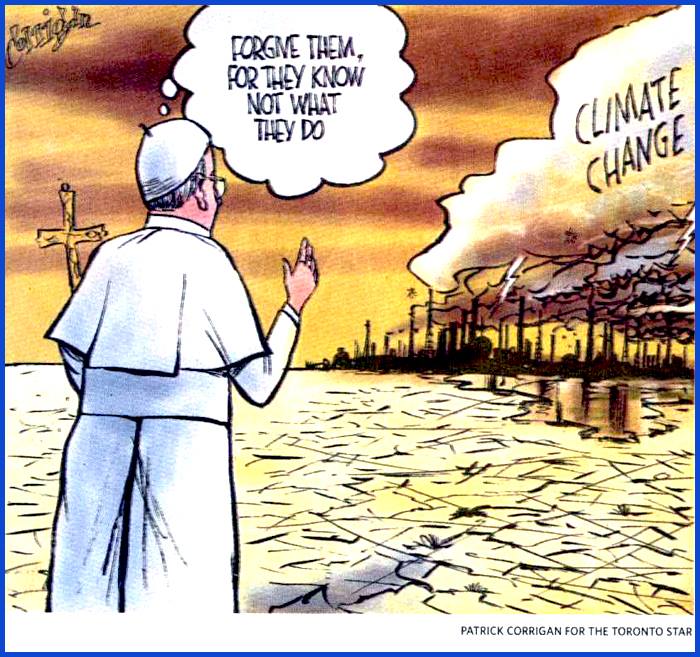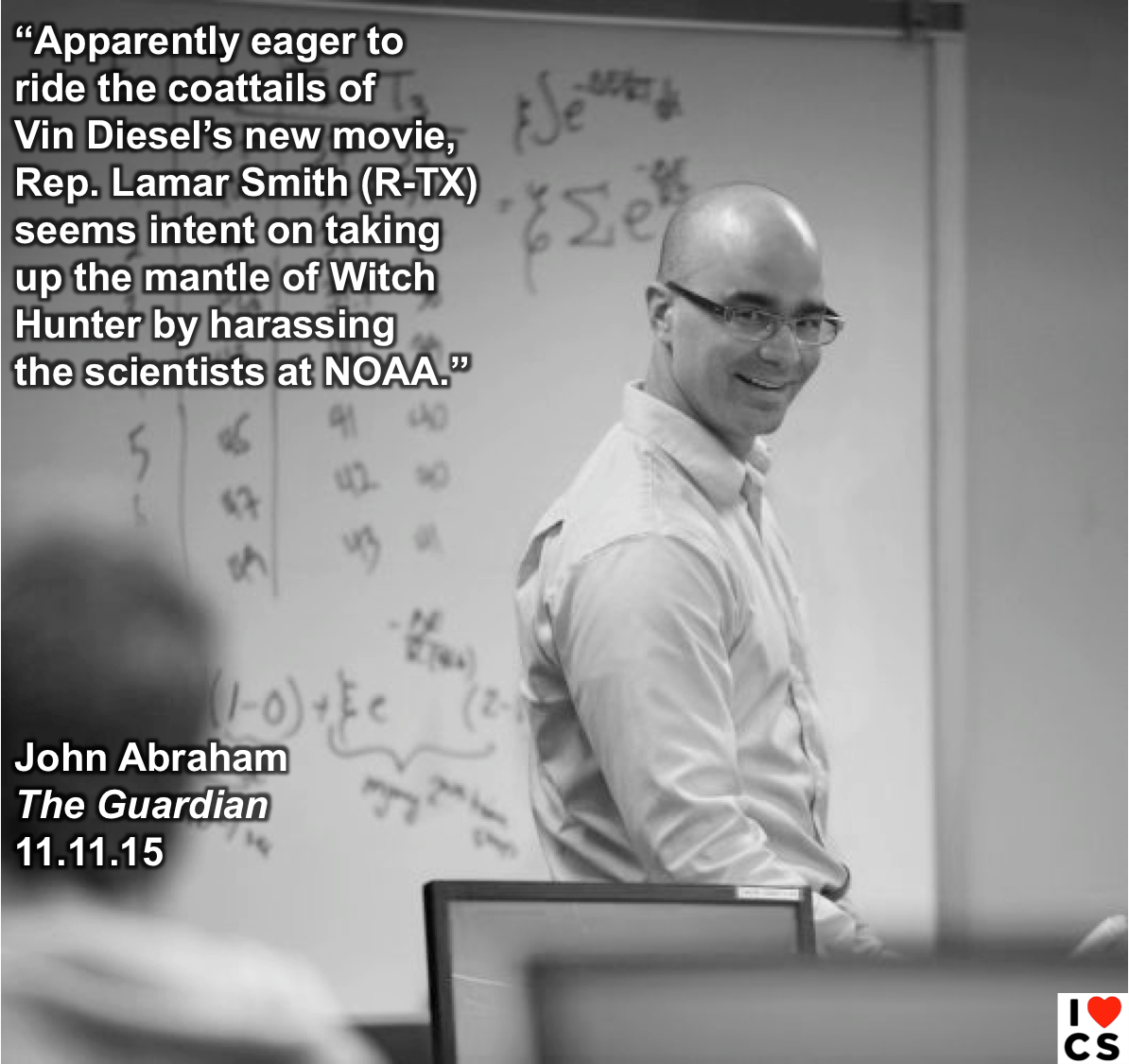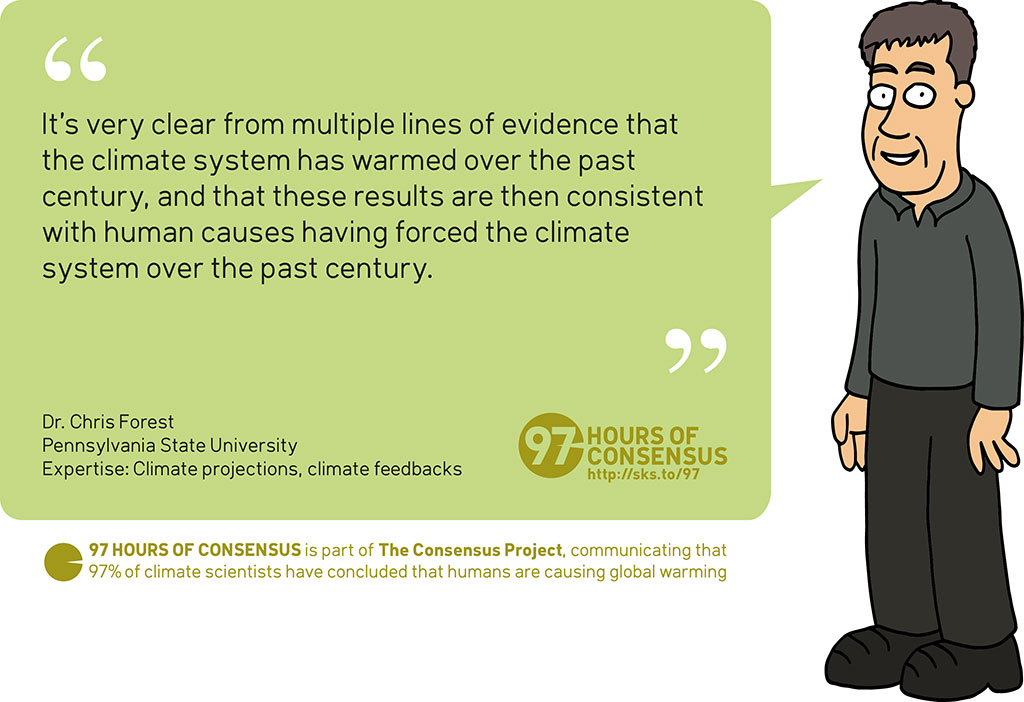2015 SkS Weekly Digest #46
Posted on 15 November 2015 by John Hartz
SkS Highlights... El Niño Watch... Toon of the Week... Quote of the Week... He Said What?... SkS in the News... SkS Spotlights... Coming Soon on SkS... Poster of the Week... SkS Week in Review... 97 Hours of Consensus...
SkS Highlights
G R A P H E N E by Riduna attracted the highest number of comments of the articles posted on SkS during the past week. The article begins with:
Have you heard of Sir Andre Geim?
You should have heard of him. In 2004 he, together with his research colleague Sir Konstantin Novoselov, made what is likely to prove the most momentous achievement of the 21st century. They isolated the 2 dimensional material graphene, identified many of its extraordinary properties and subsequently described other 2 dimensional materials. Their work is of such importance that both were awarded the 2010 Nobel Prize in Physics, knighted by the Queen and by the King of the Netherlands and over the past decade have been showered with numerous honours and awards.
If you know little about the manmade material, graphene and its potential importance in combating manmade climate change, you will want to check out this article.
El Niño Watch
El Nino 2015: Researchers say this one in the top 3 by Leigh Morgan, Al.com. Nov 13, 2015
Toon of the Week

Hat tip to I Heart Climate Scientists
Quote of the Week
“In human history it’s a one-off … and what we map out in the next two decades will be absolutely critical,” he* said. “Whether we can live in our cities – breathe in them, move in them – all of this will be defined by the decisions we take.
“I don’t think the criticalness of these 20 years is sufficiently understood.”
*Lord Nicolas Stern
'A one-off in human history': Stern's warning on climate change battle by Juliette Jowit, The Guardian, Nov 8. 2015
He Said What?
Rand Paul was having a decent night in the fourth Republican debate Tuesday, until he fielded a question about climate change. With his answer, he disappointed those who thought he might deliver reality-based comments.
Paul, like the rest of the GOP candidates, wants to repeal President Barack Obama’s legacy-making Clean Power Plan reining in carbon emissions from the power sector. On Tuesday, Paul firmly aligned himself with the science-denier camp. “While I do think man may have a role in our climate, I think nature also has a role,” Paul said. “The planet is 4.5 billion years old. We've been through geologic age after geologic age. We’ve had times when the temperature's been warmer. We’ve had times when the temperature's been colder. We’ve had times when carbon in the atmosphere has been higher. So I think we need to look before we leap."
We Can Stop Pretending Any of the 2016 Republicans Believe in Science by Rebecca Leber, New Republic, Nov 11, 2015
SkS in the News
Scientists are also aware that atmospheric carbon dioxide concentrations have been higher at points in Earth's past. According to NOAA, we recently hit 400 parts per million of CO2 in the atmosphere. The last time concentrations were that high was, depending on who you believe, either 2 or 10 million years ago. Prior to that, there were periods when it was much, much higher. Around 440 million years ago, in the late Ordovician, they think it may have topped 5,000 ppm. (Skeptical Science has a nice mini-splainer on this.)
Rand Paul says the climate has always changed. It’s true, but so what? by David Roberts, Vox, Nov 11, 2015
But here's what scientists actually say: Between 84 to 97 percent of the global scientific community says humans are causing climate change. That's based on a 2009 Pew Research survey of members of the American Association for the Advancement of Science and a 2013 review of nearly 12,000 climate change-related papers.
So there's a big gap in Americans' understanding of the scientific community's consensus and the scientific community's actual consensus on climate change.
Dana Nuccitelli, one of the authors of that 2013 review, thinks that misunderstanding correlates directly with Americans' belief in what causes climate change: If the scientists we trust are apparently unsure of whether climate change is happening, then why should we be?
No, climate change skepticism isn’t really about doubting science by Amber Phillips, Washington Post,
SkS Spotlights
The Australian-German Climate & Energy College is a new international Graduate College jointly instituted by the University of Melbourne and a partnership of German universities in the Berlin-Potsdam area. The College offers PhD candidates the opportunity to pursue research in climate change and energy transitions at a world-class level, complemented by a six month exchange program to broaden their horizons and expertise at a partner institution overseas.
Coming Soon on SkS
- The Road to Two Degrees, Part One: RCP2.6, CCS and BECCS (Andy Skuce)
- 2015 shatters the temperature record as global warming speeds back up (Dana)
- SBC Energy Institute Climate Factbook (Glenn Tamblyn)
- Guest Post (John Abraham)
- So what is really happening in Antarctica? (Jonathan Bamber)
- 2015 SkS Weekly News Roundup #47 (John Hartz)
- 2015 SkS Weekly Digest #47(John Hartz)
Poster of the Week

SkS Week in Review
- 2015 SkS Weekly News Roundup #46 by John Hartz
- Video: Drought, Climate, Security, and Syria by Peter Sinclair (Yale Climate Connections)
- Why were the ancient oceans favorable to marine life when atmospheric carbon dioxide was higher than today? by Rob Paintng
- Lamar Smith, climate scientist witch hunter by John Abraham (Climate Consensus - the 97%)
- G R A P H E N E by Riduna
- By rejecting Keystone, President Obama cements his climate legacy by John Abraham (Climate Consensus - the 97%)
- 2015 SkS Weekly Digest #45 by John Hartz
97 Hours of Consensus: Chris Forest

Quote derived with author's permission from:
"[I]t's very clear from the observations that the climate system has warmed over the past century, and that these results are then consistent with human causes having forced the climate system over the past century."
Help us do science! we’ve teamed up with researcher Paige Brown Jarreau to create a survey of Skeptical Science readers. By participating, you’ll be helping me improve SkS and contributing to SCIENCE on blog readership. You will also get FREE science art from Paige's Photography for participating, as well as a chance to win a t-shirt and other perks! It should only take 10-15 minutes to complete. You can find the survey here: http://bit.ly/mysciblogreaders. For completing the survey, readers will be entered into a drawing for a $50.00 Amazon gift card, as well as for other prizes (i.e. t-shirts).































 Arguments
Arguments






























Good Grief! Who are the 3 to 16% of global scientific community who dont accept that humans are causing climate change?
RobH @1, from page 10 of the Pew Article, we find the number of respondents by discipline:
Running the percentages, that is 49.5% from biological or medical, 13.7% from chemistry, 6.1% from geosciences, and 9% from physics and astronomy. From the first table on page 3 we find that 497, or 19.6% are in some other discipline, with 50 not responding to this question. Further, from first table on page 3, only 66% of respondents were actively involved in research. From those figures it is uncertain how many of those surveyed were actual climate scientists but it was certainly significantly less than 50%. Further, around 50% are from a discipline from which we would not expect any significant background knowledge to assist in understanding climate science.
These results are very similar to the Doran (2009) survey of Earth Scientists, of which 8.5% of 3,146 respondents published on climatology, 5% were climatologists, and 2.5% where climatologists actively publishing on climatology. Doran (2009) showed the following results on the attribution question:
That shows an 88% 'consensus' among active publishers on all topics (ie, actual research scientists) when restricted to earth scientists only, but only a 76% 'consensus' among nonpublishing, non climatoligists. Famously it found a 97% consensus among actively publishing climatologists on attribution. That is, as expertise declines as measured by either discipline, or area of research so does confidence in the consensus on attribution - but among those who are most expert as measured by both discipline and research activity, there is a 97% consensus. The results of the 2009 Pew survey of scientists are quite consistent with this.
While on the topic, the actual climate change questions in the survey were:
and
There is no ambituity in these questions on which the deniers can play their typical word games to avoid the results of a survey - though no doubt they will try.